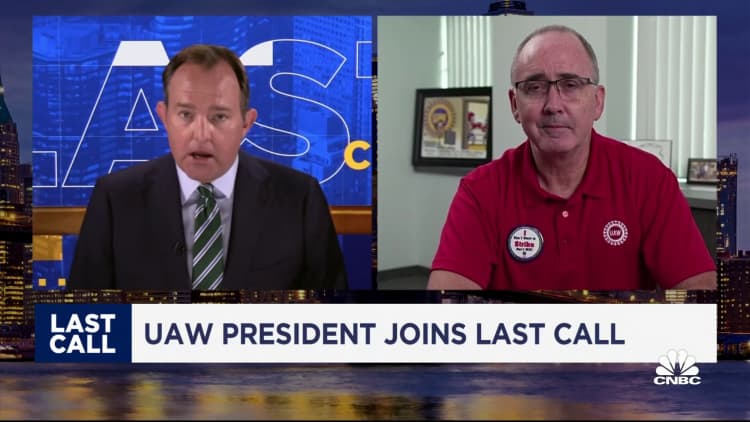United Auto Workers members on strike picket outside General Motors’ Detroit-Hamtramck Assembly plant in Detroit, Sept. 25, 2019.
Michael Wayland / CNBC
Many individuals on Wall Street believe that potential strikes by the United Auto Workers (UAW) against the Detroit automakers are mostly manageable. Some even see potential investment opportunities.
According to some, the possibility of strikes is already taken into account when considering the stocks, while others estimate that General Motors, Ford Motor, and Stellantis (the Detroit automakers, collectively known as the D-3) have the capacity to handle work stoppages and the expected increase in labor costs.
The companies and the union are currently negotiating contracts for 146,000 union members before the Thursday deadline at 11:59 p.m. ET.
“Our analysis suggests that the increase in labor costs should be mostly manageable for the D-3. Furthermore, a work stoppage should keep inventories low and maintain elevated prices, which should serve as a temporary counterbalance to higher wages,” stated RBC Capital Markets analyst Tom Narayan in a note to investors on Thursday.
Using Ford as an example (which has the highest number of UAW employees at 57,000), RBC estimated that a 10% raise for union workers would have a margin impact of 0.39%, while a 20% raise would have a margin impact of 0.79%. This estimation does not take into account potential bonuses and other possible changes such as cost-of-living adjustments, which the union has prioritized.

According to Jefferies analyst Philippe Houchois, the duration of the potential strike is what matters the most. In a note to investors on Monday, he estimated that each week of a strike could account for 4% to 5% of adjusted earnings at Ford, 3% to 4% at GM, and 1.5% to 2% at Stellantis.
The possibility of simultaneous national strikes against the Detroit automakers, which the UAW has hinted at, would be unprecedented. It could have a ripple effect on the automotive supply chain, the U.S. economy, and domestic manufacturing. Additionally, it could lead to billions of dollars in losses for the companies in terms of production, sales, and other earnings.
Despite potential downsides, Morgan Stanley analyst Adam Jonas has stated that the firm is mostly a buyer “across much of our sector leading up to and during contract negotiations.” He estimates that labor costs account for only about 4% of global revenues for the Detroit automakers.
“In conclusion, we would recommend buying both Ford and General Motors at this time and during the negotiations, as we believe that even a ‘difficult’ outcome can bring about significant and longer-lasting changes in strategy and capital discipline, ultimately benefiting shareholders more than the current labor-related headlines,” Jonas stated in a note on Aug. 28.

Jonas also mentioned that a strike could have a positive effect on used car prices and be relatively advantageous for dealers and rental car companies like Avis Budget Group and Hertz.
“A UAW strike could lead to some downward movement in stock prices due to headlines, but the stocks largely reflect the risks of a significant strike,” stated BofA Securities analyst John Murphy on Friday.
If tentative agreements are reached, the union’s demands could also be expensive. Key demands include a 40% hourly pay increase, a reduced 32-hour work week, a return to traditional pensions, the elimination of compensation tiers, and the reinstatement of cost-of-living adjustments, among other items on the negotiating table.
– CNBC’s Michael Bloom contributed to this report.












